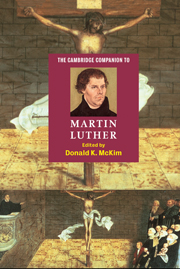Book contents
- Frontmatter
- Part I Luther’s life and context
- Part II Luther’s work
- 3 Luther’s writings
- 4 Luther as Bible translator
- 5 Luther as an interpreter of Holy Scripture
- 6 Luther’s theology
- 7 Luther’s moral theology
- 8 Luther as preacher of the Word of God
- 9 Luther’s spiritual journey
- 10 Luther’s struggle with social-ethical issues
- 11 Luther’s political encounters
- 12 Luther’s polemical controversies
- Part III After Luther
- Part IV Luther today
- Select bibliography
- Index
3 - Luther’s writings
from Part II - Luther’s work
Published online by Cambridge University Press: 28 May 2006
- Frontmatter
- Part I Luther’s life and context
- Part II Luther’s work
- 3 Luther’s writings
- 4 Luther as Bible translator
- 5 Luther as an interpreter of Holy Scripture
- 6 Luther’s theology
- 7 Luther’s moral theology
- 8 Luther as preacher of the Word of God
- 9 Luther’s spiritual journey
- 10 Luther’s struggle with social-ethical issues
- 11 Luther’s political encounters
- 12 Luther’s polemical controversies
- Part III After Luther
- Part IV Luther today
- Select bibliography
- Index
Summary
FACING INTIMIDATION
The great pleasure of reading Luther is complicated by several problems. The greatest of these is the sheer mass of material. The critical edition in German and Latin, the Weimar Ausgabe, includes sixty-eight volumes of his published writings, seventeen of his letters, twelve of documents relating to the translation of the Bible, and six volumes of Table Talk. The American Edition of Luther's Works in English contains fifty-five volumes. Even this fraction of the whole can overwhelm the strongest student.
The mention of German and Latin reminds English-speaking readers of the difficulty of reading Luther in his original languages. Any knowledge of these languages will help, but Luther's German is difficult (think of English a century before Shakespeare!) and his Latin also is quite complex. While the most important documents are available in translation, a few significant ones are not. Some translations are not especially accurate, or not based on more recent critical texts.
Some Luther writings are hard to read. One current anthology begins with Luther’s 1517 theses: Disputation Against Scholastic Theology. The argumentation in a later and very central work, The Bondage of the Will, is quite complex and difficult to follow. Many other writings are much clearer, and some are simple and delightful. Luther had a great capacity to communicate with ordinary readers.
- Type
- Chapter
- Information
- The Cambridge Companion to Martin Luther , pp. 39 - 61Publisher: Cambridge University PressPrint publication year: 2003
- 2
- Cited by

